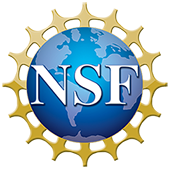Mentorship
Share your knowledge and experience with today's engineering students.
Express interest in becoming a student mentor by completing the Mentor Interest Form and enrolling in the NMSU micro-credential course, "Mentoring rising engineers through leadership engagement: Influencing a self-directed learning mindset."
The e3 Initiative, funded by National Science Foundation grant #1953466, supports undergraduate engineering students. The e3 Initiative is designed to help students gain marketable skillsets, build their self-efficacy, and become confident as aspiring engineers. When students elect to participate, they choose from more than 130 project options that span three learning tracks, at no cost to the student. Students also have the opportunity to be matched with a mentor.
Learning Tracks
e1: Certificates/Certificationse2: Entrepreneurship Training
e3: Design Projects
NMSU Micro-Credential Course for Mentors
Just as students will be developing professionally, the mentor, too, has the opportunity for professional development through the mentoring relationship. The mentor is invited to enroll in the NMSU micro-credential course created through the e3 Initiative. The NMSU micro-credential course is presented as three, one-hour modules.
Mentors of all experience levels, from novice to veteran, are invited to enroll in Module 1 of the micro-credential course, free of charge. Module1 is an introduction to mentoring, or a refresher for veterans. Module 1 introduces the mentor to some of the best practices employed by mentors around the world to meet their personal needs and the needs of the proteges they serve.
Module 2 explains the andragogy learning philosophy for adult, self-directed learners. Mentors acquire the tools to manage and facilitate the learning of rising engineers, as the rising engineers identify and seek out expertise in specific areas of interest.
Module 3 highlights the parallels between the mentoring relationship and engineering management and leadership in the profession. Module 3 helps the mentor see how he or she can use the mentoring relationship as a platform for advancement in the leadership of his or her engineering career.
Completion of all three modules satisfies three hours of the professional development hours (PDH) necessary to recertify a professional engineering license (P.E.) with the New Mexico Board of Licensure for Professional Engineers & Professional Surveyors.
In alignment with the andragogy model adopted by the College of Engineering at NMSU, all work associated with the e3 Initiative is self-directed and self-paced. Just as an engineering professional may pursue a topic to enhance their knowledge, rising engineers are encouraged to fill knowledge and skills gaps and to pursue interests that complement their career goals.The guidance that industry mentors provide students is a critical component of student achievement as part of this initiative and beyond. It is the intent of the e3 Initiative to have mentors add value to the student experience by managing and facilitating self-directed learning, providing career advice, and goal-setting support. Students should start thinking of themselves as professionals as they develop their engineering identity.Mentors help reinforce the self-directed, continuous-learning mindset. Specifically, we ask mentors to support students in completing the three objectives outlined below. Mentors are not asked to be technical advisors nor are they asked to manage a project. However, should the mentor and student(s) desire to participate in the technical aspects of the student work, that collaboration is welcome. We recognize that mentors have many demands on their time. With that in mind, we have created a simple structure with three objectives for the participating mentors.
- Objective 1: Student Readiness. Students will be asked to schedule a one-hour video meeting (Zoom, Teams, other) and to share their resume with their assigned mentor, within two weeks of the student-mentor email introduction provided by the e3 Initiative. This is an opportunity for the student and mentor to get to know one another by reviewing resumes, discussing career goals, opportunities, challenges. The meeting is also an opportunity for the mentor to share his or her own lessons learned, missed opportunities, greatest challenges and to reflect on some of the mentor's experiences as an undergraduate engineering student. So much can be accomplished with a simple conversation. A mentor can help a student develop a professional mindset by discussing their goals and how they plan to achieve them. Talking things through with an experienced professional can help students elevate their critical thinking and planning skills.
- Objective 2: Project Health. One aspect of a strategic mindset and professional attitude is knowing how to work through a problem or evaluate a challenging situation to avoid stagnation and/or failure. Students will be asked to assess the health of their progress with their certification course, design project, or entrepreneurship training.
- Objective 3: Project Completion. Students will be asked to keep their mentor up to date on their progress. Some student projects will be short (1-2 months). Others will last one semester while some, especially the design projects, may run the course of two semesters. Mentors are not expected to "teach" students how to work through math problems or how to use a particular design software. A mentor's role is to help a student think through their career goals, to help a student approach a problem thoughtfully, and to help a student set realistic goals in order to complete their project. Once the mentor has been notified by the student of project completion or once a mentor feels their contributions have been made, the mentor is asked to request an Exit Survey to close out their participation. Exit surveys can be requested by emailing: e3initiative@nmsu.edu.

The funding for the Engineering Education Enrichment | e3 Initiative was awarded to the College of Engineering, New Mexico State University by National Science Foundation Grant# 1953466.
